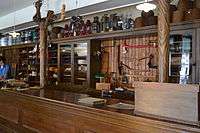Ship chandler
A ship chandler (or ship's chandler) is a retail dealer who specialises in supplies or equipment for ships, known as ship's stores.


For traditional sailing ships, items that could be found in a chandlery might include sail-cloth, rosin, turpentine, tar, pitch (resin), linseed oil, whale oil, tallow, lard, varnish, twine, rope and cordage, hemp, oakum, tools (hatchet, axe, hammer, chisel, planes, lantern, nail, spike, boat hook, caulking iron, hand pump, marlinspike), brooms, mops, galley supplies, leather goods, and paper. In the days of sail ship chandlers on remote islands, such as St. Helena, were responsible for delivering re-supplies of water and fresh produce (fruit and vegetables) to stave off scurvy.[1]

The ship chandlery business was central to the existence and the social and political dynamics of ports and their waterfront areas.[2]
Today's chandlers deal more in goods typical for fuel-powered commercial ships, such as oil tankers, container ships, and bulk carriers. They supply the crew's food, ship's maintenance supplies, cleaning compounds, rope, et cetera. The advantage of a ship's crew using a chandler is that they do not have to find stores in the town they have landed in, nor hold that local currency – assuming they are let out of the dock compound by the immigration authorities. Typically, the ship owner has a line of credit with the chandler and is billed for anything delivered to the crew of his ship. Chandlers are supplied by merchants close to wherever they happen to be.
Their distinguishing feature is the high level of service demanded and the short time required to fill and deliver their special orders. Because commercial ships discharge and turn around quickly, delay is expensive and the services of a dependable ship chandler are urgent.
References
- Engel, Matthew (January 29, 2016). "Last boat to St Helena". www.next.ft.com.
- Stinchcombe, Arthur L. (1995) Sugar Island Slavery in the Age of Enlightenment: The Political Economy of the Caribbean World Princeton University Press, Princeton New jersey, pp. 311–318, ISBN 0-691-02995-4